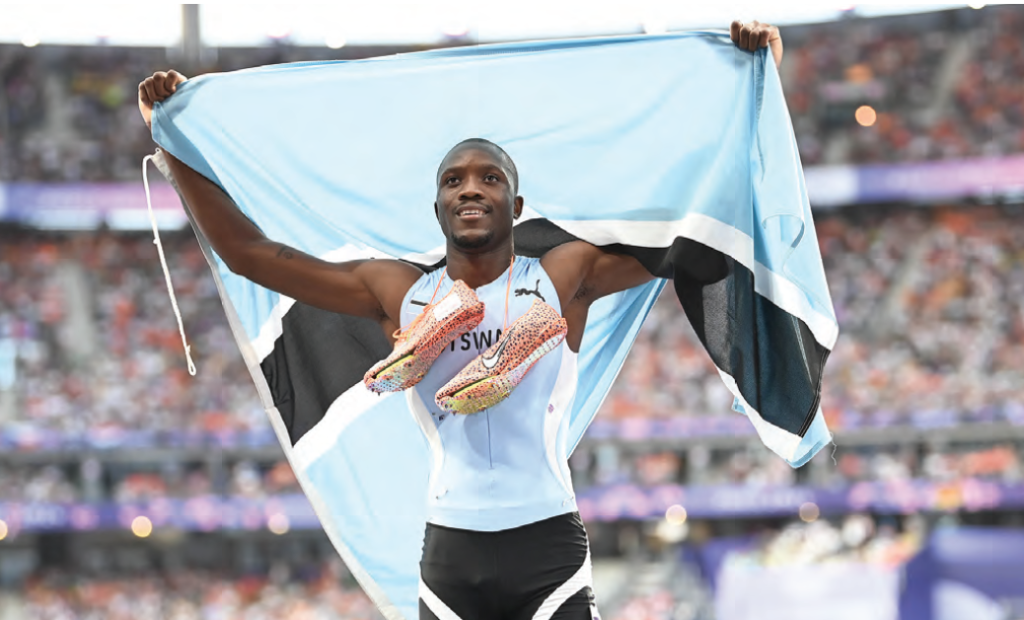Your 200m win in Paris was a first ever Olympic gold medal in any sport for Botswana. How does it feel to make that kind of history and have a national holiday declared in your honour?
TEBOGO: It was a great feeling. I didn’t expect the President to give out a holiday in my honour, but it was one of the greatest feelings ever. When I went into that race, the first thing I thought was changing the perspective of Africa from being a long-distance continent into being a short-distance continent. I looked at a lot of factors and I knew I had everything in me to make it happen. So that made me more-hungry to succeed. The night before the final I had to set down why I had started in this journey and what I wanted to achieve. At the end of the Olympic Games, would I achieve what I wanted to achieve? So that’s how I came to my conclusion. And I also thought that a lot of people were relying on me to make everything happen.
You won the Olympic 200m title in an African record of 19.46. You also ran nine sub-20 second 200m races this season. How important was this consistency to your performance in Paris and how were you able to achieve it?
TEBOGO: We didn’t even count how many 19-second races I ran in this season. Because it was Olympic year, there was just that drive in me that wanted to keep on going, even though we had to cut some races. But if it was nine times, I believe it. It showed we were really on the right track and that this was just the beginning. I didn’t change anything in training – it was just a combination of things I have been working on. It was the same environment, the same places across the continents. Nothing has really changed in our training sessions. The confidence came in from the 200m. So that’s how we went about it.
At the World Athletics Relays in May you ran a split of 43.72 to help Botswana win the 4x400m. And when you ran the anchor leg to help Botswana earn Olympic silver you clocked 43.04. Were you surprised at what you managed to achieve, and how do you rate the relay successes?
TEBOGO: In Paris I was supposed to run the final only but we had an injury and we had to look at the options. They chose me to hand over the baton in the heats. They said I should just jog out the race but when I saw the splits it was really crazy. The day of the final was the one we had all been waiting for and I was ready to give it my best. When we found out I had split 43-zero it was just crazy and we couldn’t believe it. Looking at how many times I had run during the Olympics, it showed that we were really hungry for that medal. It meant more because it was a group thing. From the beginning of the camp, that is what we had locked ourselves in for. We were happy with the silver because it was an improvement from the Tokyo Olympics and hopefully in LA 2028 we will get the gold medal.
You set two national records in the 100m – 9.88 in London and 9.86 in the Olympic final. You also set a world 300m best of 30.69 in Pretoria. How do you see your career progressing – will it involve the 100m and 200m, or the 200m and 400m, or all of them?
TEBOGO: I think for now it will be all of them. I don’t want to limit myself into a particular event. I just want to leave it open so that I know when I am training that they can use me again in the 400m, not just be the sprints guy.
You are only 21 and you have achieved so much already. What would you hope to have on your CV at 31?
TEBOGO: I would just like to be in the history books as the youngest guy to ever do it, at 21 or 22 or whenever.
Your mum was your number one. How did you manage to achieve what you did in a year when she so sadly died?
TEBOGO: I think firstly I am grateful for the team that was around me – my teammates, my coach, my family members
Because when my mother passed away, I thought it was the end of my career. Because there was no drive in me. But I remember one day I was asked: ‘Just come and watch us train.’ So, I did that, and I started getting more interested again to get back into the sport. It was a really tough balance, but I’m glad that when my mother saw that it was coming to an end, she to me: ‘I have tried to be strong my son, now it is your turn.’ So, I think she was preparing me for what was going to happen. It was not an easy journey and it was not an easy thing for me to overcome. I had to also be there for my little sister, be there for myself. My sister is 12. I don’t think she is going to follow in my footsteps because she is more into swimming, but she is proud of me.
